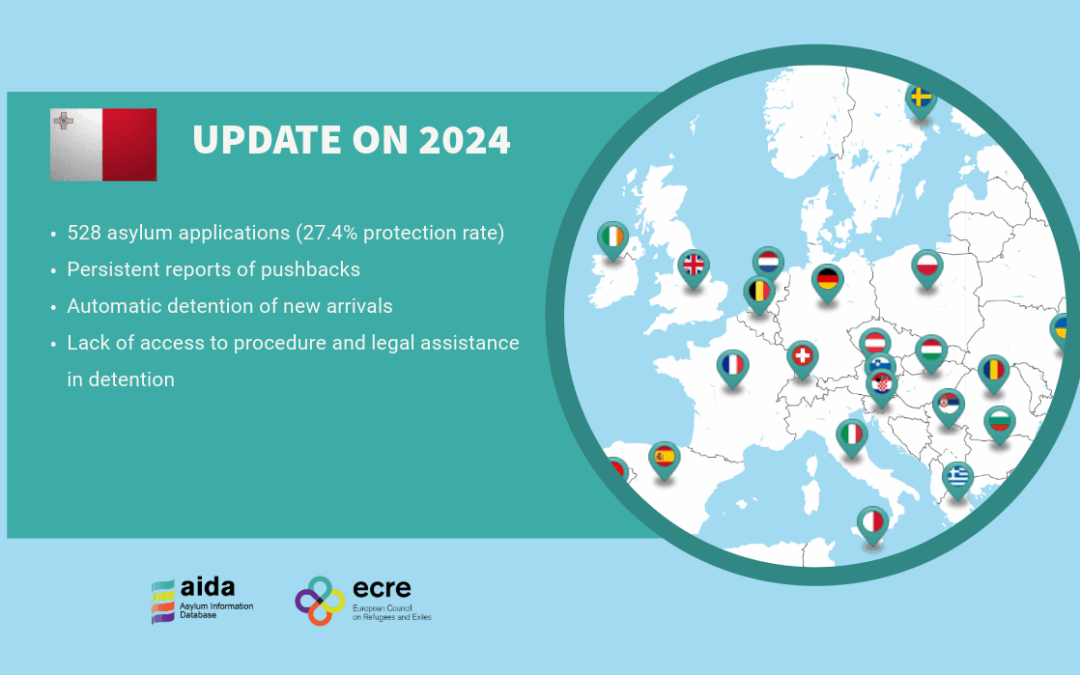|Published on: 20th August 2025|Categories: News|

The updated AIDA Country Report on Malta provides a detailed overview on legislative and practice-related developments in asylum procedures, reception conditions, detention of asylum applicants and content of international protection in 2024.
A number of key developments drawn from the overview of the main changes that have taken place since the publication of the update on 2023 are set out below.
Asylum procedure
- Statistics: There were 528 applications, including 444 first applications, in 2024. 204 applications came from Syrian nationals. At the end of 2024, 507 applications were pending at first instance. The International Protection Agency took 985 decisions at first instance and the International Protection Appeals Tribunal took 450 decisions at second instance (27.4% overall protection rate). Of the 985 first instance decisions, 586 were negative on the basis of procedural issues.
- Access to the territory: There were only 239 sea arrivals in 2024. As in previous years, there were multiple reports of incidents in which Maltese authorities failed or delayed to intervene, instructed private ships not to rescue people in distress at sea or engaged in co-operation with the Libyan Coast Guard. These types of incidents were also flagged by the United Nations in two human rights reviews that were conducted in 2024.
- Automatic detention of new arrivals: In 2024, Malta reverted to automatically detaining most new arrivals for a quasi-mandatory minimum of two months on public health grounds under a regime that was judged illegal by both Maltese courts and the European Court of Human Rights (ECtHR). In addition, people were arrested and detained on the premises of the asylum office where they had gone to submit their spontaneous asylum applications. This practice even affected a number of people who held valid visas and was implemented during the visa free period.
- Inadmissibility criteria: Practitioners expressed concern at a number of inadmissibility decisions that were taken on the basis of an applicant having been granted international protection in another EU member state, even when that international protection was not actually being enjoyed, either due to revocation or withdrawal following non-renewal.
Reception conditions
- Conditions in open reception centres: Despite the very low number of people that arrived in Malta in 2024, living conditions in the open reception centres remained challenging for most residents. Although there were improvements in the provision of support and care in some centres, especially those accommodating the most vulnerable people, living conditions for all asylum applicants remained a serious challenge.
- Withdrawal of reception conditions: The policy of withdrawing material reception conditions for most applicants following six months of residence in a reception centre has been maintained, even though it is not formally described or treated as a withdrawal. In 2024, the Agency for the Welfare of Asylum Seekers strengthened its material support for applicants who opted to live in the community. However, this remains an exceptional approach rather than a mainstream programme.
Detention of asylum applicants
- Lack of access to the procedure and legal assistance for new arrivals: People in detention faced increased challenges in accessing the asylum procedure or participating in it effectively. Detained newly-arrived applicants were denied any form of contact with NGOs or other forms of independent support.
- Detention of vulnerable people: In 2024, vulnerability assessments that had previously been the exclusive remit of AWAS were carried out by the Detention Services Agency. This resulted in the increased detention of vulnerable people. In addition, the adoption of a number of legal amendments also increased the use of detention for children.
- Appeals mechanism for detention decisions does not meet European Convention on Human Rights (ECHR) standards: An ECtHR ruling found that the Immigration Appeals Board (IAB), which is tasked with deciding on the legality of detention decisions as well as age assessment appeals, does not fulfil basic requirements of impartiality and independence from the government, and is therefore not an effective remedy under the ECHR. Despite this judgement, no changes were made to the IAB in 2024 or early 2025.
- Detention conditions: Living conditions in detention centres remained extremely poor, particularly for vulnerable people and children in 2024. This was confirmed in an ECtHR judgement, a report by the European Committee for the Prevention of Torture and Inhuman or Degrading Treatment or Punishment (published in mid-2025) and several other reports by human rights bodies.
Content of international protection
- Access to naturalisation: Access to naturalisation was further restricted following a decision to increase the minimum residence requirement for refugees from 10 to 15 years. Beneficiaries of subsidiary protection – in addition to being permanently ineligible for family reunification, are required to have lived in Malta for at least 20 years.
- Derivative status of family members and loss of protection: A number of children of refugees who turned 18 in 2024 reverted to an undocumented status as Malta does not recognise derivative protection status for refugees’ dependent family members and several factors prevent them from being eligible.
- Re-accessing protection status following lapse in documentation due to expiry: People whose international protection had been withdrawn in 2024 due to administrative reasons, namely failure to renew documentation following expiry, faced serious challenges in being reinstated into the asylum procedure.
The full report is available here.
For more information about the AIDA database or to read other AIDA reports, please visit the AIDA website.
